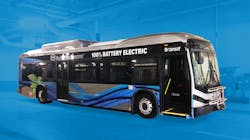Saskatoon Transit to test first electric bus
Saskatoon Transit in Saskatchewan, Canada, will be testing an electric bus over the next year as part of the public transport fleet. This initiative supports elements of the Official Community Plan and the city of Saskatoon’s Strategic Plan goals of Environmental Leadership and Moving Around.
"Buses already help tackle climate change by providing a way to get around other than in cars or trucks. With more people taking transit in Saskatoon, electric buses will make a real difference. This pilot helps Saskatoon Transit achieve our goal of replacing 10 conventional buses with electric buses per year, creating an all-electric fleet within the next 10 years." Jim McDonald, director of Saskatoon Transit.
The total project cost is estimated to be C$533,600 (US$398,431) of which C$234,300 (US$174,948) is funded from the Green Municipal Fund (GMF), a fund financed by the Government of Canada and administered by the Federation of Canadian Municipalities (FCM).
The addition of the bus also marks a milestone in Saskatoon’s Low Emission Community Plan, which prescribes the municipal transit fleet be 100 percent electric by 2030. The electric bus project’s net carbon emissions reduction is expected to be 50.3 tonnes of CO2 per bus, per year (this number accounts for the bus and the electrical grid’s emissions-intensity factors) and saves approximately C$27,500 (US$20,533) in fuel costs per bus, per year.
This project will include a strong focus on how an electric bus will perform in Saskatchewan’s very cold winter weather, which will be of interest to many other Canadian communities with longer, colder winters. Also, Saskatoon Transit’s collaboration on this project with the Saskatchewan Research Council will be valuable to replicate it and share that knowledge across the province.
Quick facts:
- The electric bus can be charged in approximately 5 hours
- One bus is expected to reduce 50.3 tonnes of CO2 per year (this number accounts for the bus and the electrical grid’s emissions intensity factors) and save approximately C$27,500 (US$20,533) in fuel costs per year compared to a conventional diesel bus
- This electric bus pilot initiates one of the 40 actions in the Saskatoon’s Low Emission Community Plan for the municipal transit fleet to be 100 percent electric by 2030. The city will also start testing electric vehicles later this year as part of another transportation action to electrify the entire municipal fleet
- The electric bus unit number will be 1948, representing the year the first 8 electric buses hit the streets of Saskatoon
Benefits:
- Improved air quality at transit terminals, and along bus routes will improve public health
- Less noise pollution along bus routes will improve the community’s quality of life
- Lower operation and maintenance costs
- Offering a modern transit system will help to increase transit ridership
